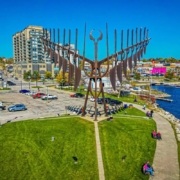Tax on Airbnb Income in Edmonton: the Definitive Guide for Hosts
If you’re a resident of Edmonton, Canada, and you’re earning income from Airbnb rentals, it’s important to understand the tax implications of your earnings. As with any form of income, you are required to pay taxes on your Airbnb earnings. In this article, we’ll provide you with a definitive guide on the tax on Airbnb income in Edmonton, including how to calculate your income, expenses that you can deduct, and how much are eligible to deduct.
Airbnb Management in Edmonton.
Calculating Your Airbnb Income
The first step in understanding your tax obligations is to calculate your Airbnb income. This includes any money you receive from guests who rent your property through Airbnb, as well as any additional income from services you provide, such as cleaning fees or additional charges for guests who stay longer than a certain period. It’s important to keep accurate records of all your earnings, as well as any related expenses.
Expenses that Airbnb Hosts Can Deduct
While you’re required to pay taxes on your Airbnb income, you’re also entitled to deduct certain expenses related to your rental property. These expenses include mortgage interest, property taxes, insurance, utilities, repairs, and maintenance. Keep in mind that you can only deduct expenses that are directly related to your rental property, and not personal expenses.
How Much is Eligible to Deduct
The amount of expenses that you can deduct will depend on how much of your property is used for rental purposes. If you rent out a portion of your home, you can only deduct a portion of the expenses that are directly related to that portion of your home. For example, if you rent out 50% of your home, you can only deduct 50% of your mortgage interest, property taxes, insurance, utilities, repairs, and maintenance expenses.
Earning of Rental Income Which Can be Claimed

It’s important to note that the Canada Revenue Agency (CRA) considers income earned from short-term rentals, such as those on Airbnb, to be rental income.
GST/HST
If you earn more than $30,000 in a year from your rental property, you’re required to register for a GST/HST account and charge GST/HST on your rental income. However, if you earn less than $30,000 in a year, you’re not required to charge GST/HST.
You’ll also be able to claim input tax credits (ITCs) for any GST/HST that you pay on expenses related to your rental property. This includes cleaning supplies, linens, and other items you purchase to maintain your rental property.
Registering for a GST/HST account is a straightforward process that can be completed online through the CRA website. Once registered, you’ll need to charge the appropriate amount of GST/HST on your rental income and remit the tax to the CRA. The amount of GST/HST you charge will depend on the province or territory where your rental property is located. For example, in Alberta, the GST rate is 5%, while in other provinces and territories, it may be higher.
It’s important to note that failing to register for a GST/HST account or charging the wrong amount of tax can result in penalties and interest charges. To avoid any issues with the CRA, make sure that you’re charging the appropriate amount of tax and remitting it on time.
Other Requirements Airbnb Hosts need to meet to conduct Airbnb business
In addition to paying taxes on your Airbnb income, you may also be required to obtain a business license or permit from the City of Edmonton. This will depend on the specific rules and regulations in your area, so it’s important to research the requirements in your location. Failing to obtain the necessary licenses or permits can result in fines and penalties.
Apply for a Business Licence | City of Edmonton
To make tax reporting easier, it’s a good idea to keep accurate records of your rental income and expenses throughout the year. This can include things like rental agreements, receipts for repairs and maintenance, and invoices for services provided. By keeping organized records, you’ll be able to quickly and easily calculate your net income at tax time, as well as any eligible deductions.
It’s also important to note that if you’re renting out a portion of your home, you may be eligible for the principal residence exemption. This exemption allows you to avoid paying capital gains tax on any increase in the value of your home that’s directly related to the portion of your home that’s used for rental purposes. However, to be eligible for the exemption, you’ll need to meet certain criteria and keep accurate records of your rental activity.
Explore Tax on Airbnb Income London, Ontario.
Conclusion
Earning income from Airbnb rentals in Edmonton can be a great way to supplement your income, but it’s important to understand your tax obligations and take steps to ensure that you’re meeting them. By keeping accurate records, deducting eligible expenses, and registering for a GST/HST account if necessary, you can ensure that you’re operating your Airbnb rental property in compliance with all relevant laws and regulations. Additionally, seeking advice from a tax professional can help you navigate any complexities and maximize your tax savings.
Check out How to start an Airbnb business in Edmonton.












